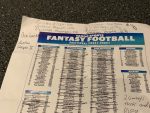Four years after its inaugural article, ESPN’s art-house wunderkind website Grantland closed abruptly last week—no sendoff columns from their acclaimed sports writers, no confetti or streamers, not even a valedictory cake or sappy “Thanks For Everything” piece for closure.
All that’s left of Grantland’s memory (besides memorium posts like this) is a message on the site saying milquetoastly, “It was a good run.” And so it is that after four years of giving cutting-edge sports media the old college try, Grantland is now officially dead and gone, and all I’m left with is the memory of deeply analytical pop and sports cultures pieces, and the image of Seth Rogen stoned, staring off in the distance.
Grantland was the brainchild of one of the world’s most outspoken sports critics and characters, Bill Simmons. At the time of his appointment as editor, the website was seen as a ticking time bomb. The blending of sports and pop culture was a surefire hit, but under his direction the site focused less on drawing traffic and more on publishing insightful, almost literary content. Articles climbed northwards of 7,000 words—nearly two chapters in most Harry Potters—and other pieces mined niches so deeply that the analytical oil they struck was unlike anything else on the net.
This is where the site succeeded. Grantland didn’t pander for views with clickbait-laden titles like “5 Hedgehogs With Things That Look Like Hedgehogs,” but encouraged writers to pen articles that required an investment larger than a passing glance. On average, website visitors spend fifteen seconds on a page. At Grantland, the average reader stayed for 2 minutes and 47 seconds. And if you asked my ex-girlfriend, she’d would’ve wondered why I couldn’t imitate the site and take a little bit longer — to talk about her day! But I’m not a machine, Karen, and I can only listen to you talk about “Our Brand is Crisis” so many times.
But, that’s also where the problems came from. Grantland was only able to generate around nine million unique views—and although they were long views from committed readers—the numbers pale in comparison to sports sites like Gawker (25 million) and their parent company ESPN (200 million).
A commercial site’s primary purpose is—astonishingly—commercial, and therefore needs to make money through ad revenues.
But with Grantland’s decision to prioritize quality over viewership, combined with Simmons’ firing after his harsh criticisms of the NFL, it was only a matter of time before the site went under.
Yes, Simmons bit the hand that fed, but his site was hamstrung long before that by a larger problem, one that’s not altogether common in sports journalism. The site essentially faced the SEO version of the artist’s dilemma: choose between staying penniless but true to your craft, or sign the dotted Faustian line and make bank.
In a lot of ways, the pickle boils down to a simple silent majority/vocal minority situation. A small group of really vocal people might appear to have a disproportionate amount of influence, but in things like politics and clicks, where individuals cast individual votes and the only thing that really matters is turnout, vocal minorities might make a big fuss but they still lose in the end.
It happens everywhere. In TV and film, there’s always the one guy going on about how much of an unappreciated gem Freaks and Geeks is (coincidentally starring Seth Rogen), but I, like the rest of the country, will ignore him and turn the volume up on Mike and Molly, because no, thank you, I don’t want to watch James Franco scare me. Now can I please just have my pumpkin spice latte?
The same thing happens in sports media: the articulate, indie website might seem like the lofty and sublime choice, but if they’re not drawing traffic then it’s a moo point. See, the problem with the vocal minority is that while it looks equal to the majority—comments, user interaction and feedback appear to be good indicators of traffic—the numbers don’t lie. Not enough people were visiting the site. Grantland had passion, but passion can only get you so far.
From ESPN’s perspective, a hundred dollars each from 1, 000 readers is heartwarming, but one dollar from ten million casuals is less risky and more profitable. Look at Indie Go-Go or Kickstarter. They’re examples of how small donations turn into big profits. In fact, to prove my point, I’ve made a Kickstarter that will harness the power of people to end racism amongst koalas. Click here to donate. Honestly, even though I love Grantland, if I were ESPN I’d make the same choice. And once you add on top of its relative unprofitability the fact that Grantland was making ESPN look bad—which is very much not what ESPN had in mind when, with Do a Good Turn Daily tattooed on its knuckles, they created the site—the decision seems pretty sane.
Ultimately, Grantland’s fatal flaw was poetic in its injustice. It was created by ESPN primarily as a way to up the site’s street cred and prove its ethos to sports junkies, so it didn’t even need Grantland to make a huge profit. That way, they could have their cake with Sportscenter (make money) and eat it with Grantland (credibility).
But Bill Simmons’ highly-publicized split from ESPN and Grantland’s vaguely elitist air (the albatross of all intelligentsia) meant that not only was Grantland a sort of dead weight, it was actually hurting ESPN—something that’s a lot worse than a benign, marginally profitable website.
In the end, in ESPN’s eyes, Grantland was more trouble than it was worth. At its core, Grantland stayed true to Bill Simmons’ dream of a high-brow, culturally literate sports website, and as a result it failed to drum up a viewership buoyant enough to keep the site afloat. The Simmons junkies and other assorted members of the vocal minority will follow their Pied Piper on his journey to HBO (I too will be following the music), and the silent majority will move to ESPN’s new “indie” site, fivethirtyeight, which is ironically headed by Nate Silver, a man who Simmons very badly wanted on his Grantland staff.
Your author was a committed member of the vocal minority, and rest assured he was crushed when Grantland was snatched away so suddenly, and although Grantland lived only four years, it got me through college, a devastating game six in 2013, and a fifth ring for Los Spurs. It also introduced the world to some great writers. So maybe Grantland isn’t so different from Freaks and Geeks, a show that not many watched while it was on the air, but a program with a cast of up-and-coming actors that was so insanely talented that ten years in the future the world looked back and said, “Holy shit, how did people not watch that back then?!”
















